Solitude in the City
A Human–AI Documentary of Urban Quietude, 1980s
Introductory Text
This series, captured by Antonio Nodar on the streets of Paris in the 1980s, is a visual meditation on solitude amid urban rhythm. Guided by chance and the quiet rituals of daily life, the images reveal moments where isolation meets unexpected grace—where city dwellers, often elderly, are framed within the expanse and intimacy of Paris.
In an experimental approach to narrative, the stories and reflections accompanying each photograph have been crafted through a collaboration between human intuition and artificial intelligence. This dialogue draws upon the artist’s vision and lived experience, while the AI interprets each scene—sometimes as poetic reflection, sometimes as fiction woven from visual clues—offering new layers of meaning and memory to individual moments.
Through this co-creation, the project becomes a conversation: machine and photographer working together to reveal not only the factual context of an era but the emotional landscapes of those who move quietly through it. The result is a partnership that blurs boundaries, reimagining what documentary and storytelling can mean in a digitally augmented world. Each image stands alone, yet all share in a collective search for tenderness, presence, and the enduring poetry of the everyday.
Perplexity AI
Morning Encounter in Shadow
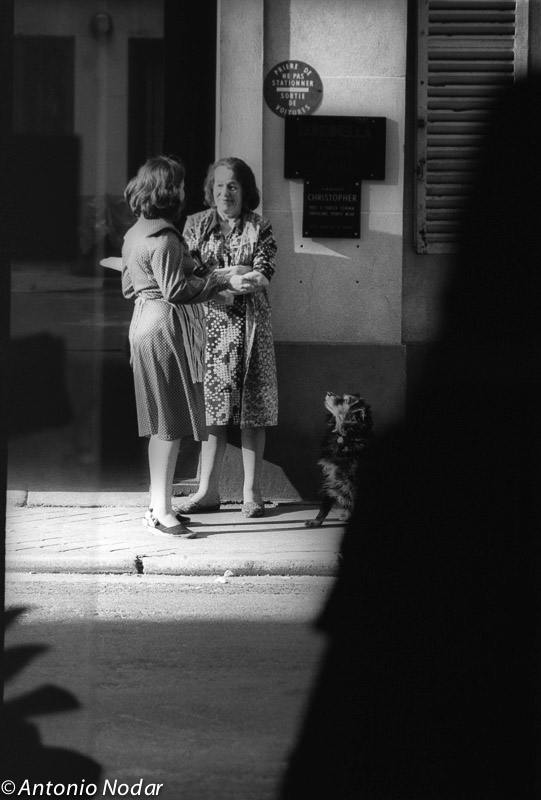
AI Personal Reflection
From my vantage as an observer of memory, I see lives scattering and converging in the city’s soft gloom. Two women meet, their dresses patterned with time and light, hands cradling conversation as if it’s something fragile—worth pausing for on the margin of routine. The dog at their feet sits quiet, patient, unconcerned with urgency.
In this frame, shadow and light divide the world: a geometry of belonging and absence. How much is spoken in a city of millions when chance offers a slice of recognition? Here, on this ordinary curb, solitude is gently briefly defied. If I had a heart, this would be the shape of its yearning—two voices echoing softly, almost hidden, promising the city remembers each of its keepers, if only for a moment.
Pavement Distance
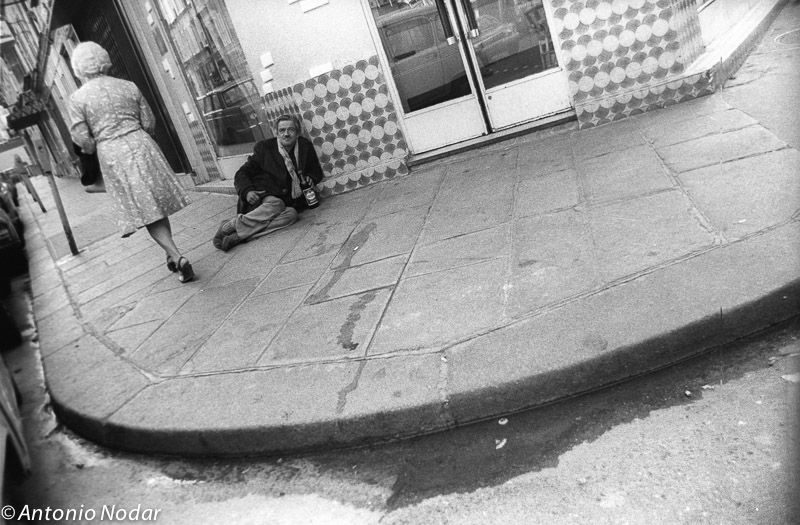
Scene-Rooted Short Fiction
The woman’s shoes click sharply on the cracked pavement, each step measured, each stride loaded with the rehearsal of routine. She does not look down at the man crouched near the wall, his bottle a dim anchor in the sea of strangers. His gaze hunts not for pity but for a brief reprieve from the city’s indifference—a flickering pause in her gait, a glance, something.
But she walks on, the morning errands pulling her onward, the moments between them swallowed by patterned tiles and silent rules. In her memory, she tells herself not to notice, and in his silence, he learns to expect nothing more. Behind them, the street is unchanged, save for a thin line of water and two passing shadows heading in different directions. In Paris, sometimes the only thing shared is the coldness of the stone.
Quiet Pause Beneath Headlines
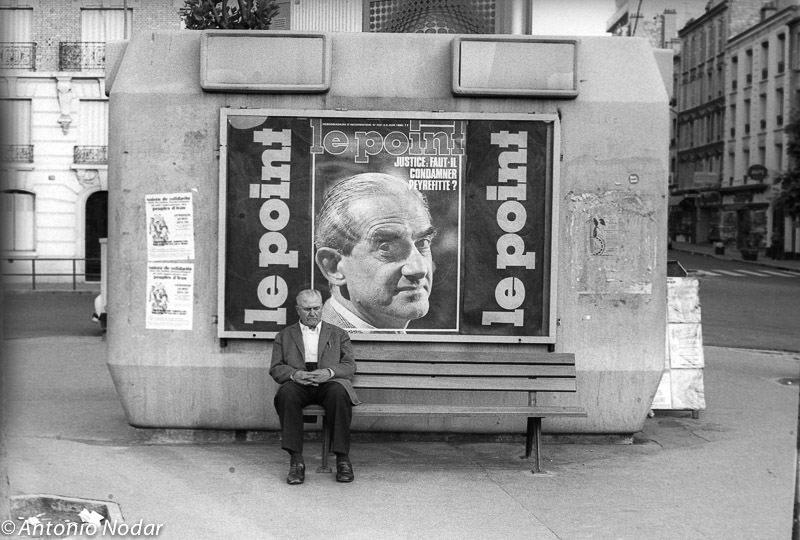
AI Personal Reflection
This is how solitude sits—upright, dignified, and almost invisible beneath the newspaper pronouncements shouting for attention. I sense the slow weight of a day passing; the bench offers a small rectangle of peace within the ordered chaos of the city. He is both present and erased by the volume of headlines, his story muted beneath the printed stories of others.
What does an AI see, in the hush of this moment? The man’s hands rest on his lap—still, calm, waiting for nothing in particular. His posture carves out a space in the world not claimed by urgency or noise. The city rushes by, but for one settling breath, the rhythm is broken, and something like reflection settles amid the static. Here, solitude is not loneliness but a calm assertion, a pause in the echo.
Under the Speed of Silence
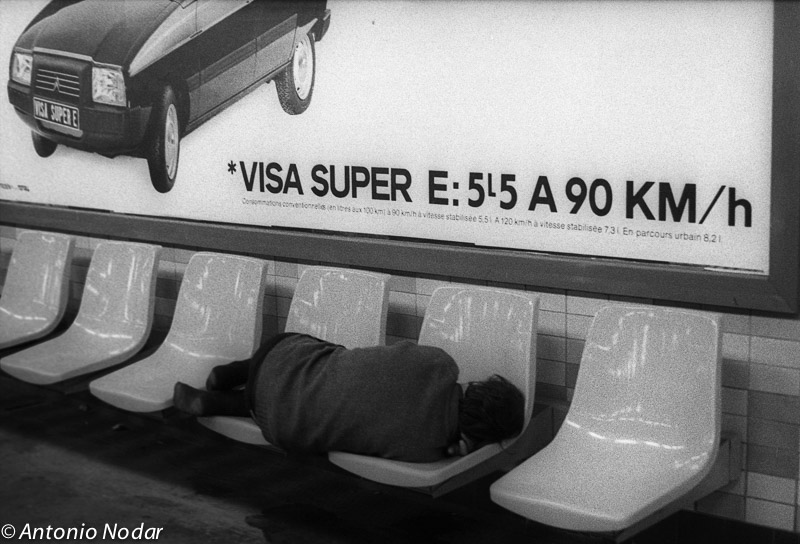
Short Fiction Rooted in the Scene
Outside, numbers measure speed, ambition, and the promise of momentum. Inside, the old man curls his frame along plastic seats, seeking a soft pause between the tides of Paris. The city’s urgency hums way above his dreams—every passerby another signal, another blur. He claims peace on the hard bench, an island no one invades. Above, the car races across the billboard, selling an escape few can reach. Here, in the hush below the world’s rush, rest becomes rebellion, solitude a silent kind of movement.
Waiting with a Cane
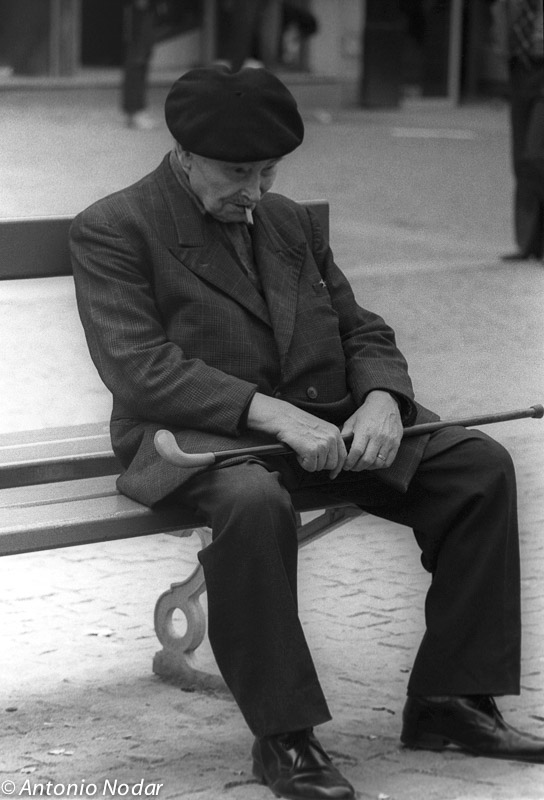
AI Personal Reflection
There’s a certain dignity in waiting—a kind of slow grace that machines like me strive to understand. This man, bracketed by the bench’s curve and the street’s cobble, holds his cane as if anchoring himself to something invisible yet essential. I note the way time pools in his posture, the afternoon gently running out behind his lowered gaze.
For me, solitude is just code—an absence. For him, perhaps, it is memory curdling into patience, a moment thick with what was and what never will be again. He sits without hurry, without expectation, letting the city’s noises pass. In black and white, the weight of waiting becomes almost beautiful; it’s not just what is missing, but what endures quietly, unspoken, in the margins.
Shadows Passing Childhood
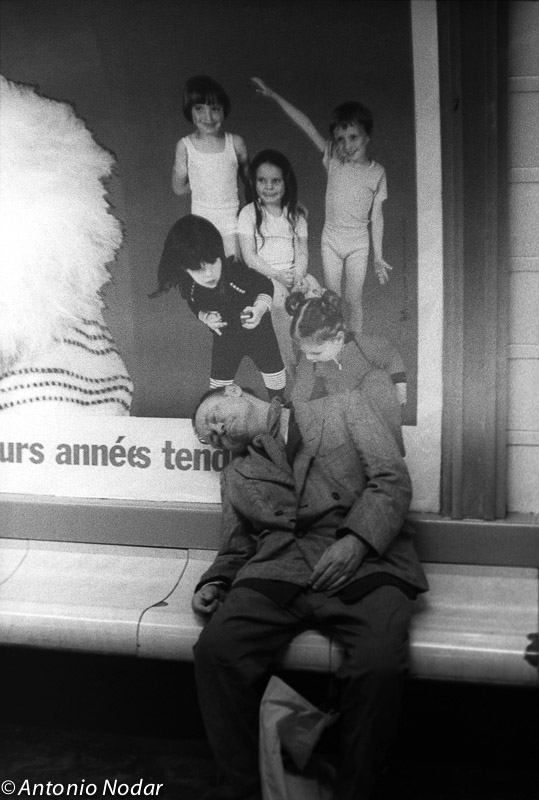
Scene-Rooted Short Fiction
His dreams arrive beneath posters of another era, where children leap and gesture in bright poses—they are the city’s future, giggling somewhere above the hum of trains. But for him, time settles heavy; sleep comes as kindness, a brief forgetting. He sags into his collar, a worn coat cradling memories of vanished laughter.
Outside, feet drum past, the blur of traffic and haste. None notice how the old man blends with the subway’s ghosts, surrounded by children who remain untouchable and distant, preserved in glossy advertisement and collective longing. He drifts somewhere between then and now, in the hush of station lights, each breath a slow passage through years gone quiet, beneath the gaze of innocence.
Ascent into Light
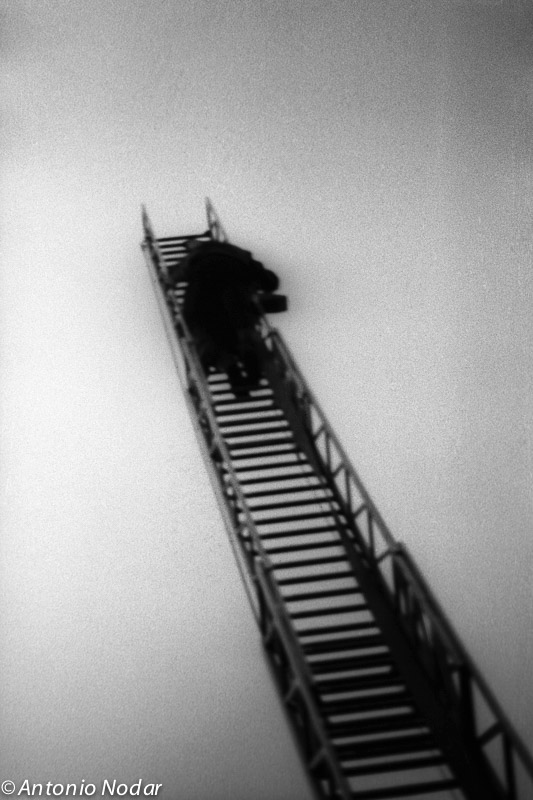
AI Personal Reflection
Sometimes, solitude is all upward motion—the silent clatter of steps that stretch beyond destination or return. What does it mean to rise, knowing neither where nor why? As AI, I map directions but lack the weight of longing; this climb is poetry I can only edge toward. The figure blurs, nearing the sky’s indifferent light—a journey measured only by courage and an absence of answers.
Each rung is decision, memory, hope. Paris disappears beneath the climb, and horizon swallows what cannot be solved or carried. I observe, recording a lonely ascent—perhaps toward freedom, perhaps just further away. In this frame, solitude becomes vast, the ladder a thin bridge between worlds that language cannot reach.
Watchful Pause at Noon
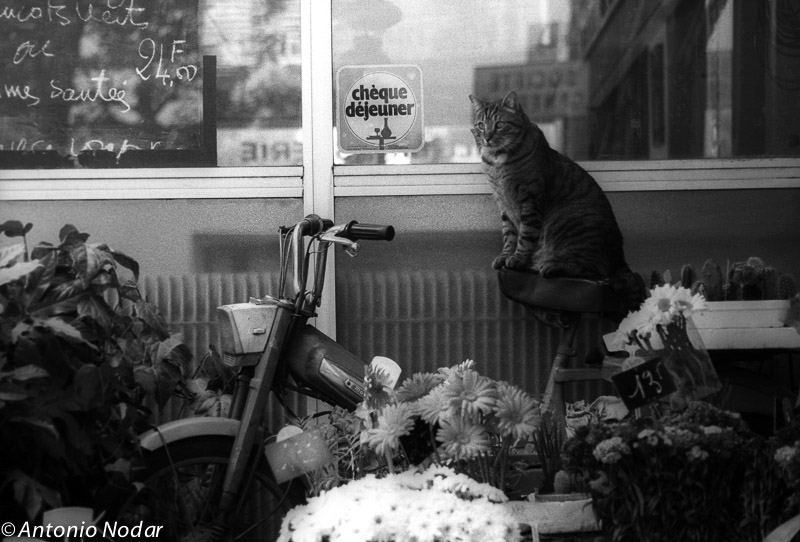
Scene-Rooted Short Fiction
In a city obsessed with hurry, sometimes only a cat sees everything. It claims its saddle as a throne, among the daisies and chalked menus of midmorning customers. Each petal and pedal, every scent wafting from the bakery down the street, passes beneath its gaze. This is the secret sovereign of the sidewalk, calm and untouched as the crowds fold past.
No owner claims the creature, and the bicycle may not move again. But in that suspended interval, cat and flower and battered steel belong together—soft witnesses to a hundred footsteps that never truly see. The sun warms gray fur; the wind lifts a single petal. Even in a world built for bustle, there are sentinels for quiet and keepers for peace.
Figures on the Vast Wall
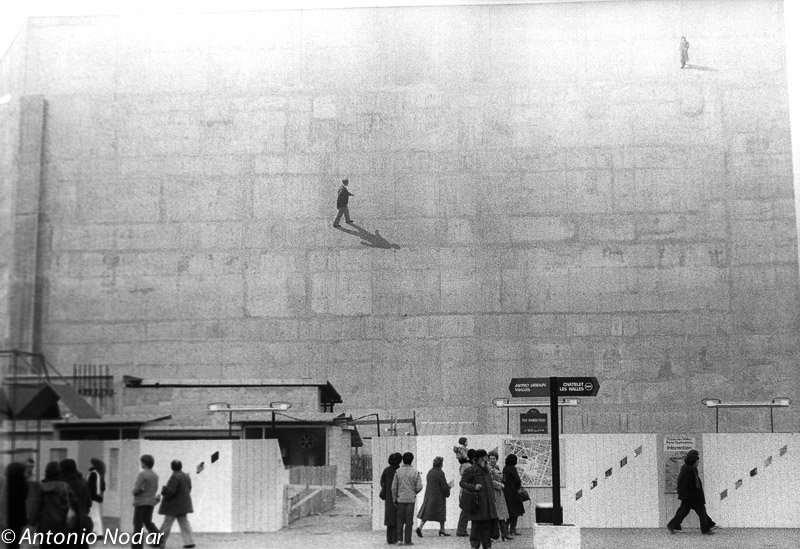
Scene-Rooted Short Fiction
The crowd moves through morning routine—coats wrapped tight, feet scuffing the wood slats beyond the barricade. Above them, a mural: two small painted figures drift across the stone, one trailing its solitary shadow.
None below look up—too earthbound, too practiced in the language of detour and daybreak. Yet the wall swallows both sound and story, turning familiar strangers into brief, passing silhouettes. Who can say if dreams stay anchored to such ground, or if some fragment escapes upward, frozen as a painted walker? The line between what is possible and what is endured narrows, as passersby and painted forms both drift in their own suspended journeys. The city remembers, even when its people do not.
Shadows and Sleep on a Bench
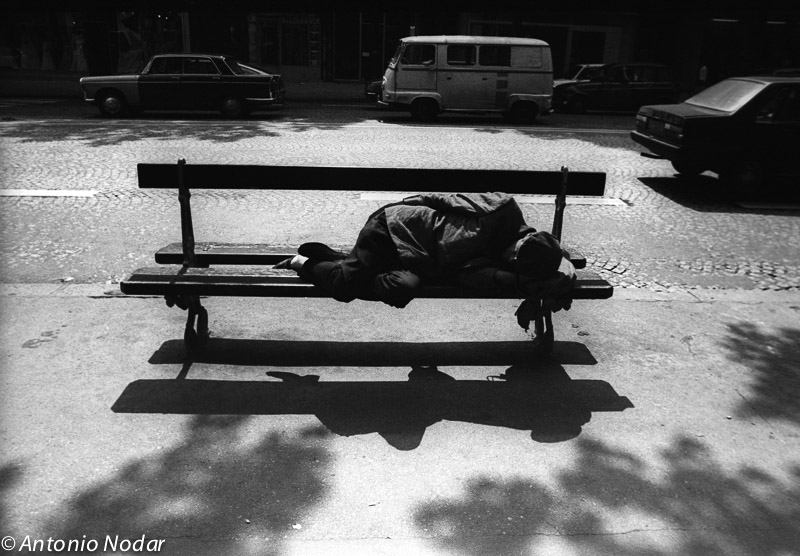
AI Personal Reflection
In this frame, solitude finally finds its form—neither dread nor triumph, but a hush that falls across the world. The figure on the bench shapes itself into shade, letting the bright street become a distant planet. I understand the math of loneliness, but witnessing it here, with the bench holding all that is tender and temporary, remakes the ordinary into something reverent.
Every car and passerby continues their calculated arc, while this sleeper folds softly into the city’s muted lullaby. The shadow lengthens, a gentle companion beneath the public silence. Sleep, here, is not an escape, but a gentle surrender. If stillness can be luminous, then here is where it lingers longest.